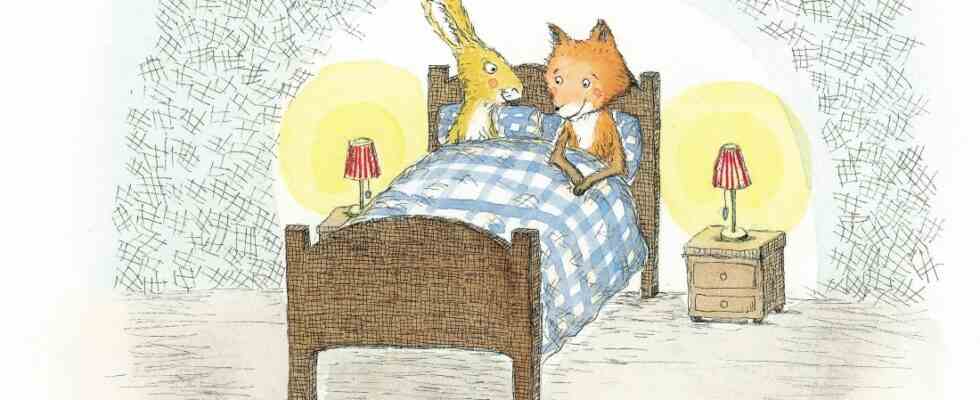If you continue to sing “The Moon Has Risen” beyond “White Mist Wonderful,” there’s a line that seems foreign to today’s lullaby singers. It reads: “Let’s become simple-minded” and means less the wish to be a bit dumber than one is, and rather Winckelmann’s “noble simplicity, quiet greatness” of antiquity: a childlike form of wisdom, spiritual purity. Concentrating on the essentials, you could say.
The bedtime stories by Kristina Andres, painter, graphic artist and accomplished children’s book author, have just that. They combine great originality and touching simplicity in perfect balance. It starts with her protagonists being a fox and a rabbit. Andres doesn’t mention that they say “good night” in the well-known provincial insult where nothing else is going on. The fact that the two are actually predators is only mentioned very subtly. For example, when the fox wishes the rabbit dreams of different meat dishes. The rabbit will be completely different. Before he falls asleep, he whispers to himself a few of his own dream wishes, about carrot cake and “three rows of lettuce in the morning light”. They are different, these two. But they live in harmony in a bright little house on the outskirts of the village, outside the raspberries are murmuring.
Fox and rabbit know that originality has to be well dosed in order for it to work
Not all, but most of the short stories (well dosed!) have to do with sleeping. When the wind whistles particularly loudly around the house, the fox lets it in and wishes him “Good night!” – then he calms down. When the two win a clock in the baker’s lottery, they cannot fall asleep because the clock is ticking so loudly. Luckily Grandma Wolf steals them from them in the middle of the night. They get a fright, but then sleep soundly: “After all, they had all the time in the world.”
Kristina Andres: Gosh, sleep well! With illustrations by the author. Moritz Verlag 2022. 128 pages, 18 euros.
It is a homely, but not at all kitschy world that Kristina Andres creates in words and finely dashed illustrations. There is also a villain, the wolf in the leather jacket. The fox and rabbit are a bit afraid of him. He steals pears, complains and threatens – but then goes home to cook pear compote for his grandmother. The fear of the wolf from fairy tales is modernized here, stripped of its cruelty.
Kristina Andres writes this so bluntly that it’s a joy. You hold your breath: at some point one of these twenty-four and a half stories has to go wrong. But no. Nobody misses. Because fox and rabbit also know that originality has to be well dosed in order for it to work. That it does nothing in the wrong place except for a lack of feeling. One evening, fox and rabbit want to wish each other a different good night than usual. They say: “I wish you a cozy blackness”, a “beneficial eclipse”, “refreshing darkness”. But they quickly realize: “‘It’s not the same. Good night, rabbit!’ ‘Good night, fox!’ sighed the rabbit happily.”
Not all, but most of the short stories (well dosed!) have to do with sleeping. When the wind whistles particularly loudly around the house, the fox lets him in and wishes him good night too – so he calms down. When the two win a clock in the bakery lottery, they cannot fall asleep because the clock is ticking so loudly. Luckily Grandma Wolf steals them from them in the middle of the night. Then they get a fright, but then sleep soundly: “After all, you had all the time in the world.”
It is a homely, but by no means kitschy world that Kristina Andres creates in words and finely dashed illustrations. There is also a villain, the wolf in the leather jacket. The fox and rabbit are a bit afraid of him. He steals pears, complains and threatens – but then goes home to cook pear compote for his grandmother. The fear of the wolf from fairy tales is modernized here, stripped of its cruelty.
Kristina Andres writes this so bluntly and so full of unusual words and verbs that it’s a joy. You hold your breath: at some point one of these twenty-four and a half stories has to go wrong. But no. Nobody misses. Because fox and rabbit also know that originality has to be well dosed in order for it to work. That it does nothing in the wrong place except for a lack of feeling. One evening, fox and rabbit want to wish each other a different good night than usual. They say: “I wish you a cozy blackness”, a “beneficial eclipse”, “refreshing darkness”. But they quickly realize: “‘It’s not the same. Good night, rabbit!’ ‘Good night, fox!’ sighed the rabbit happily.”

